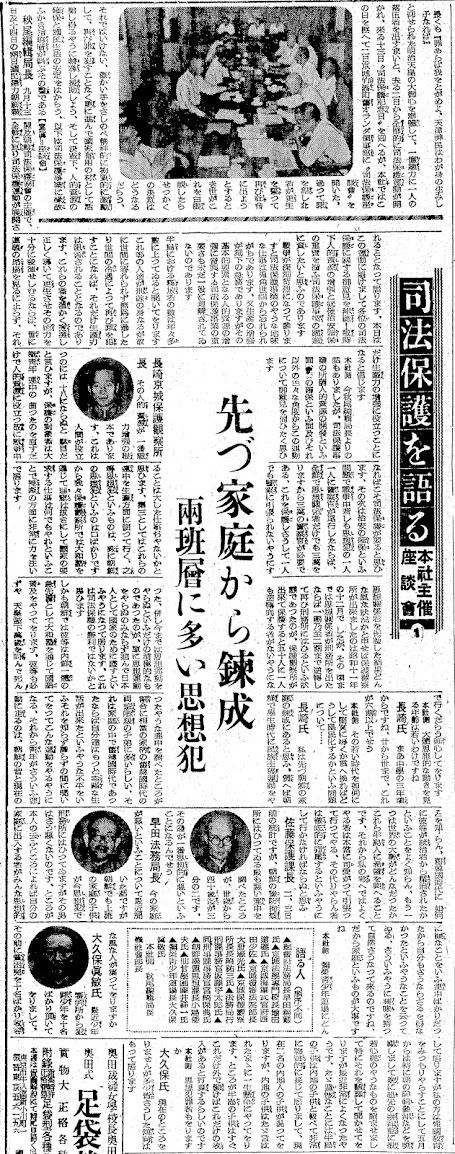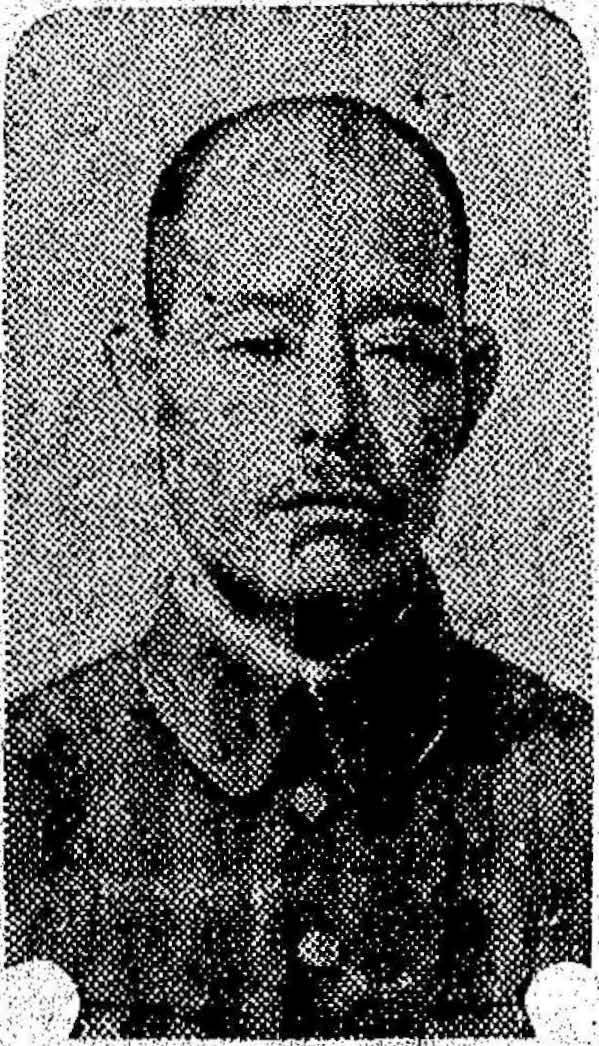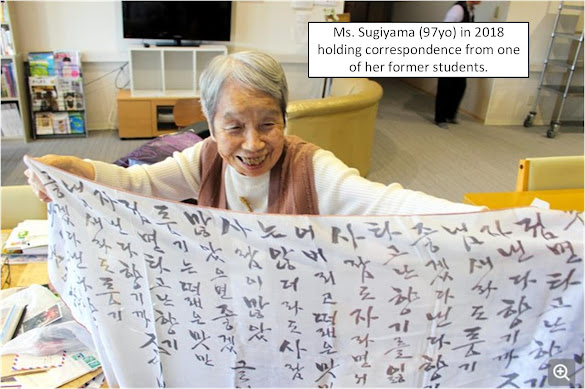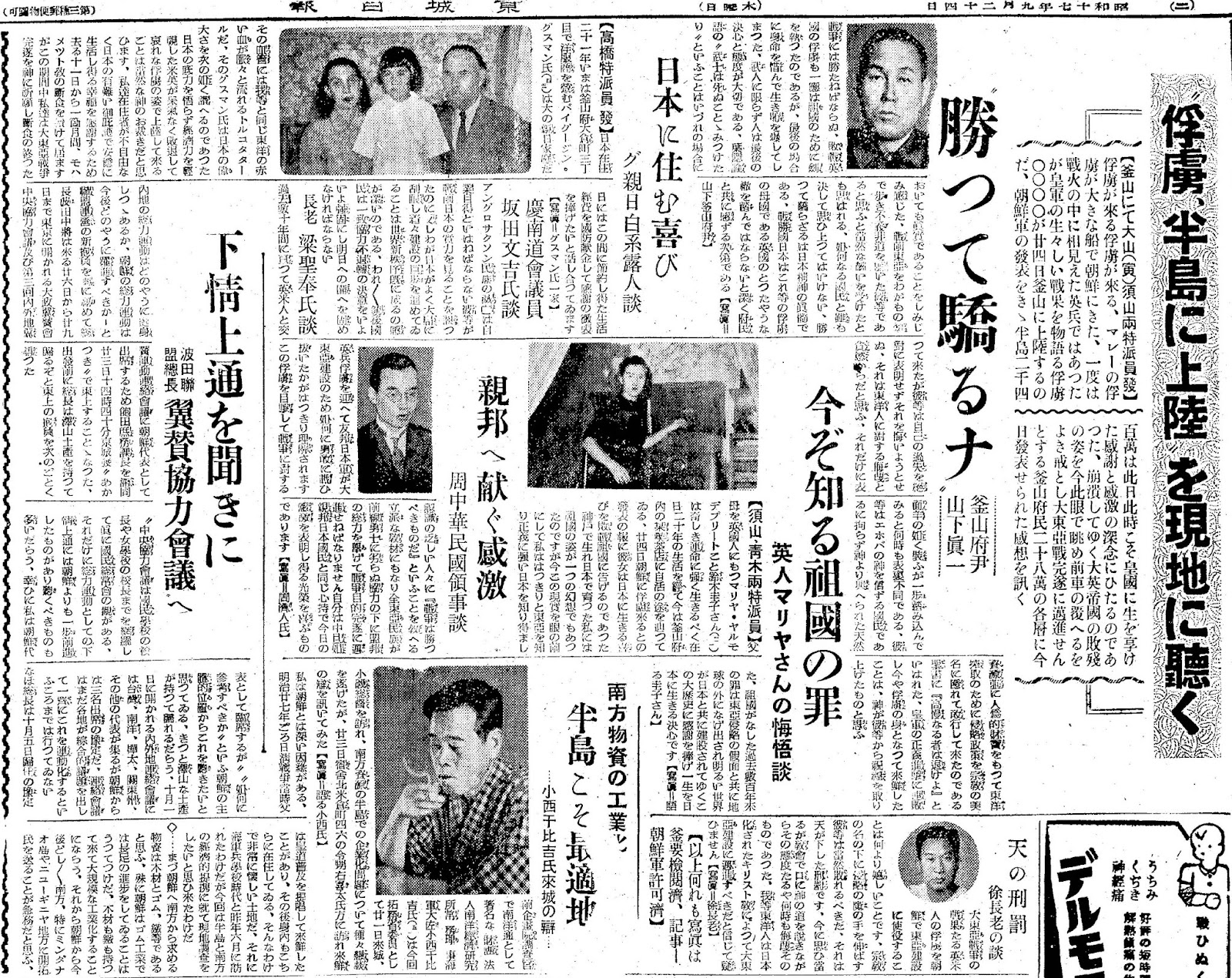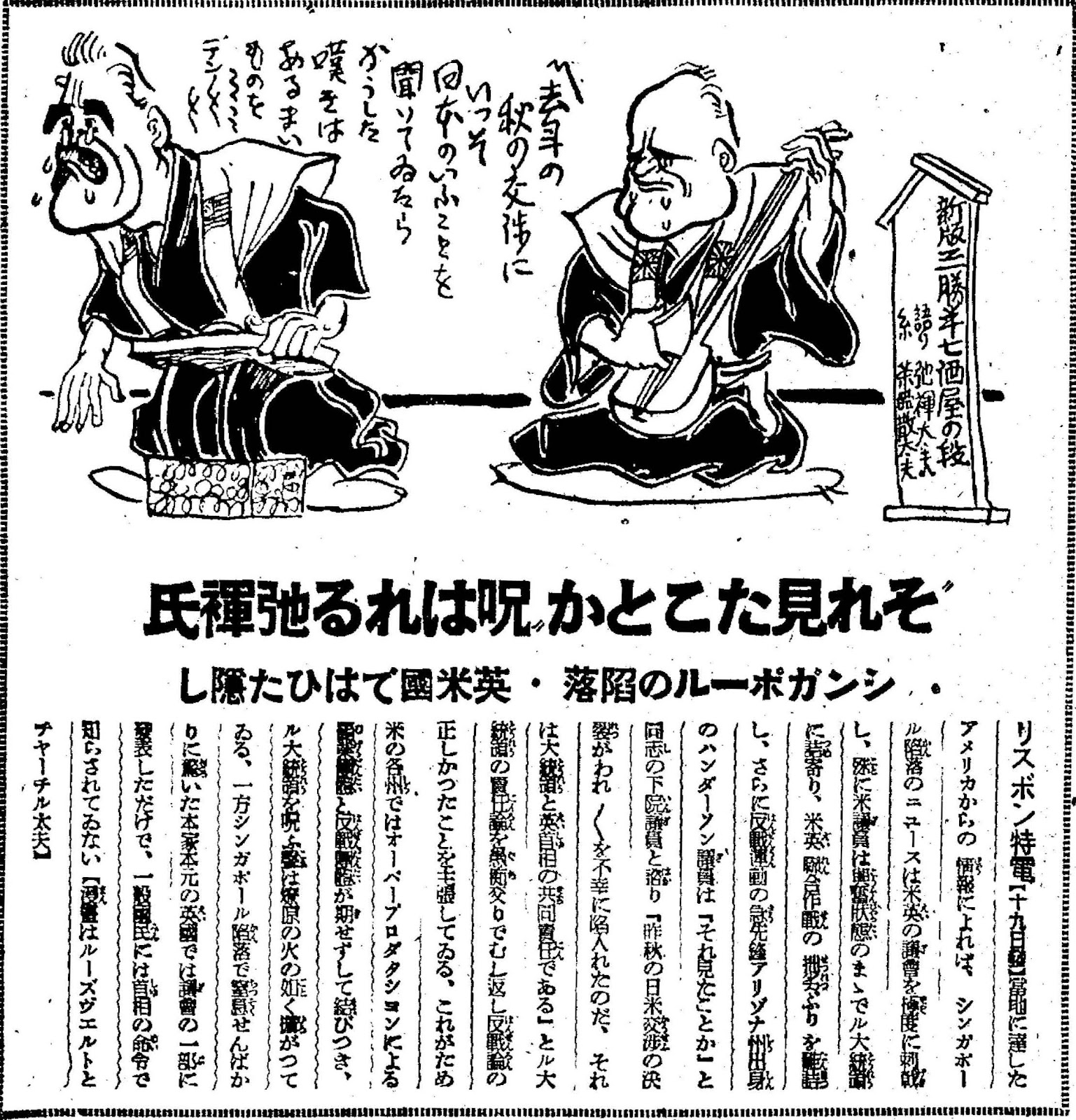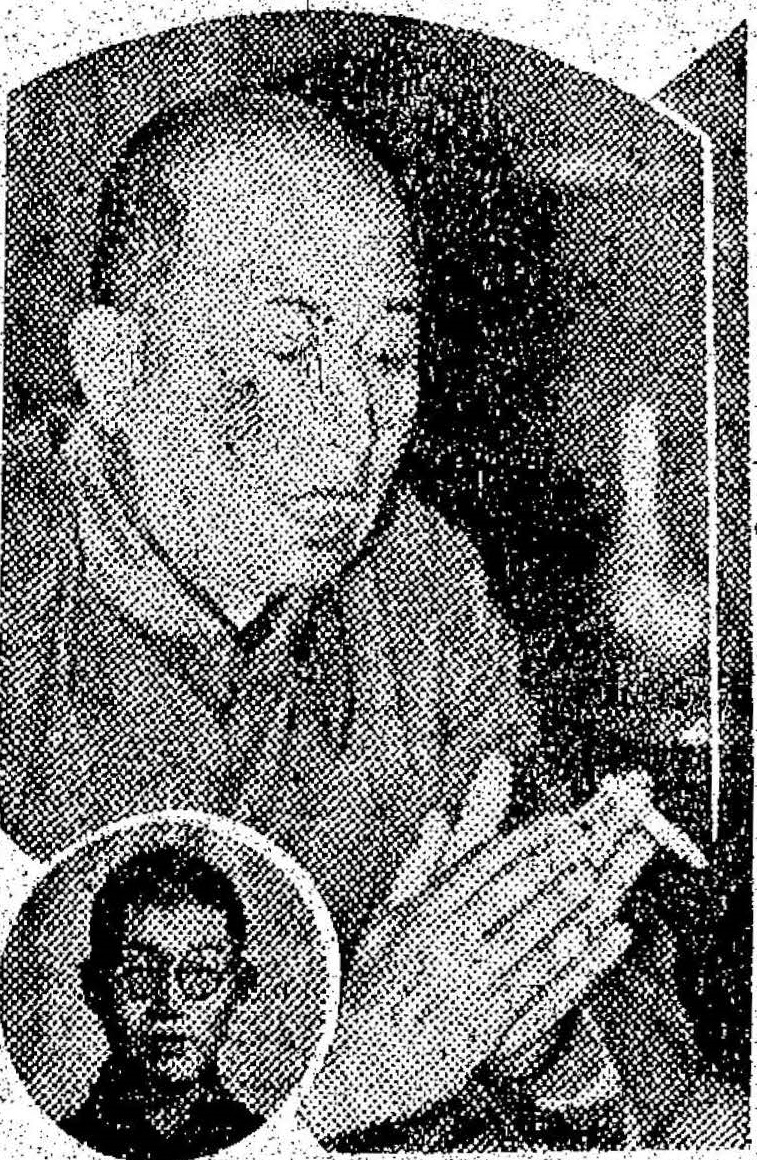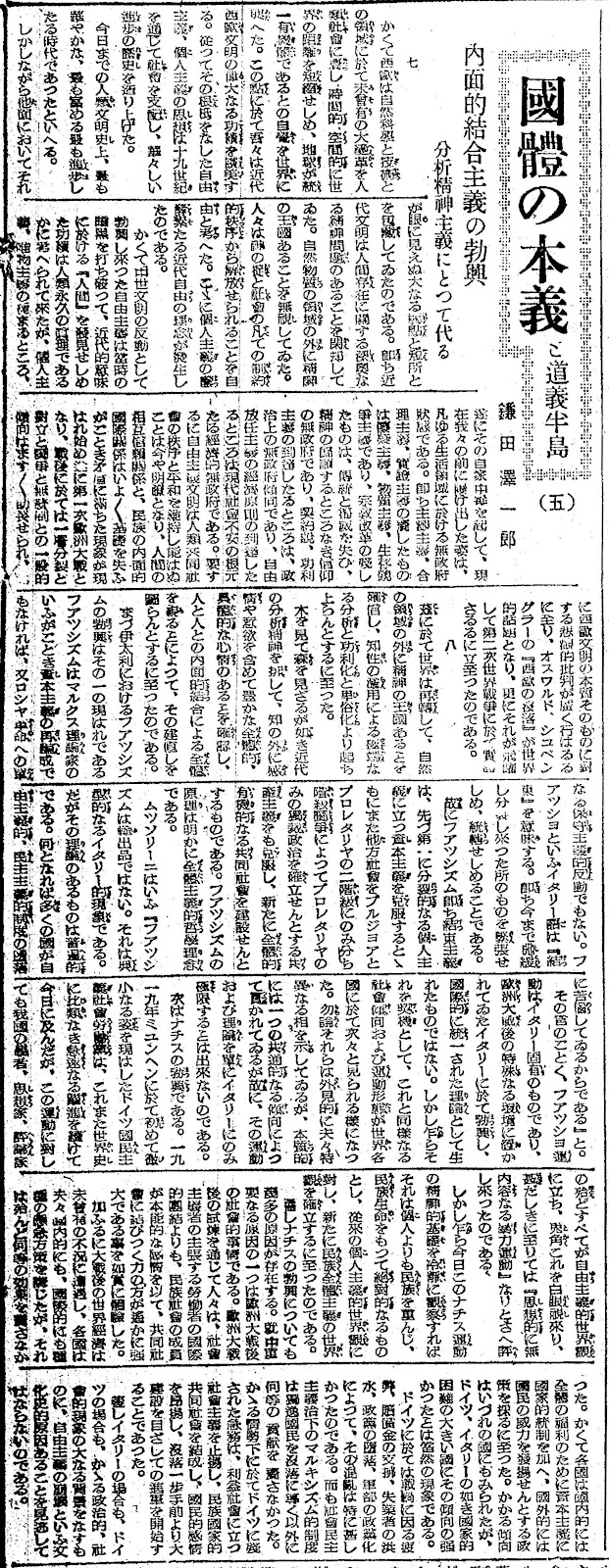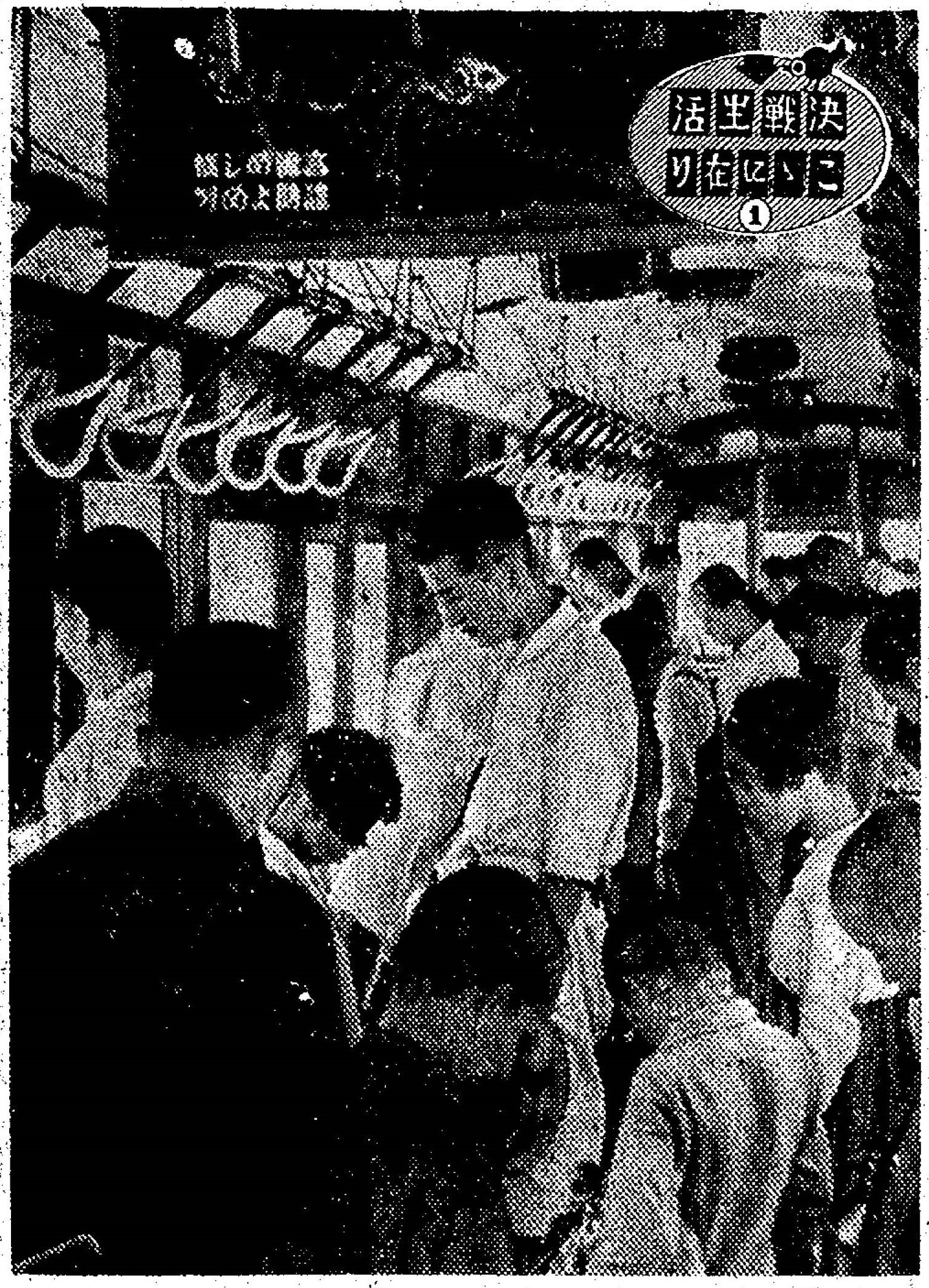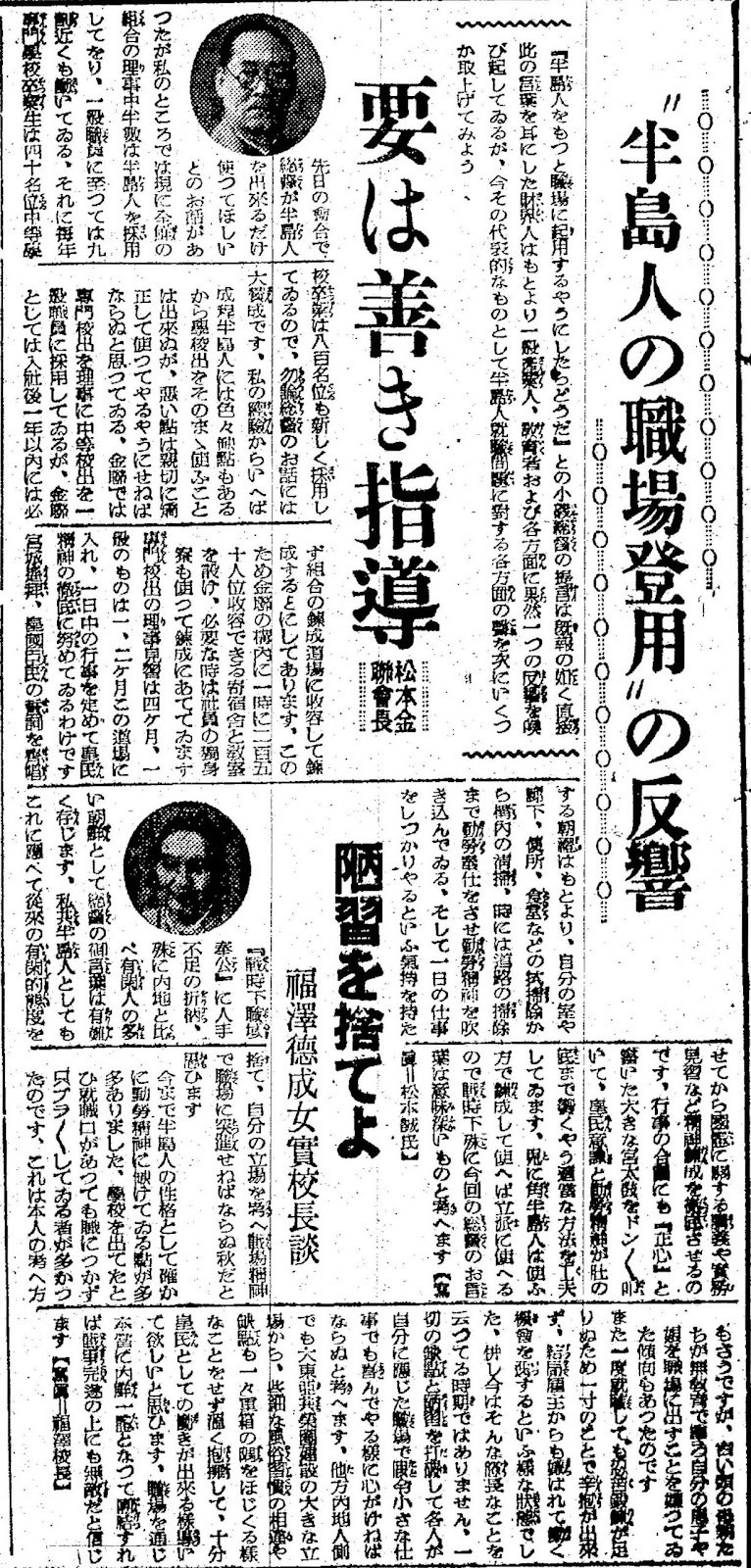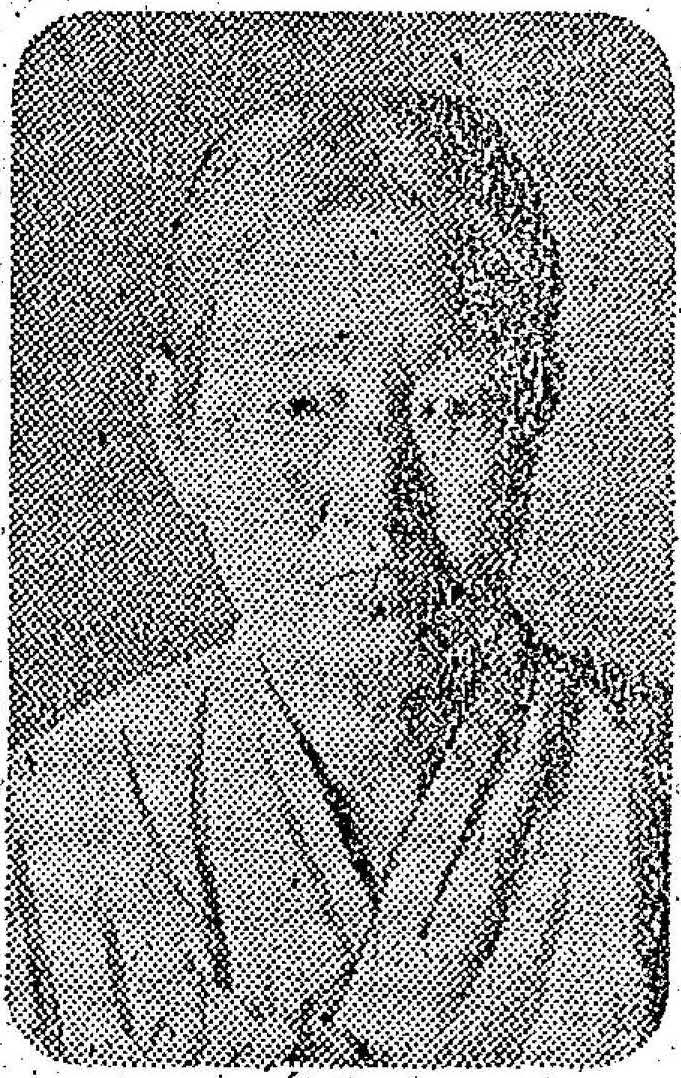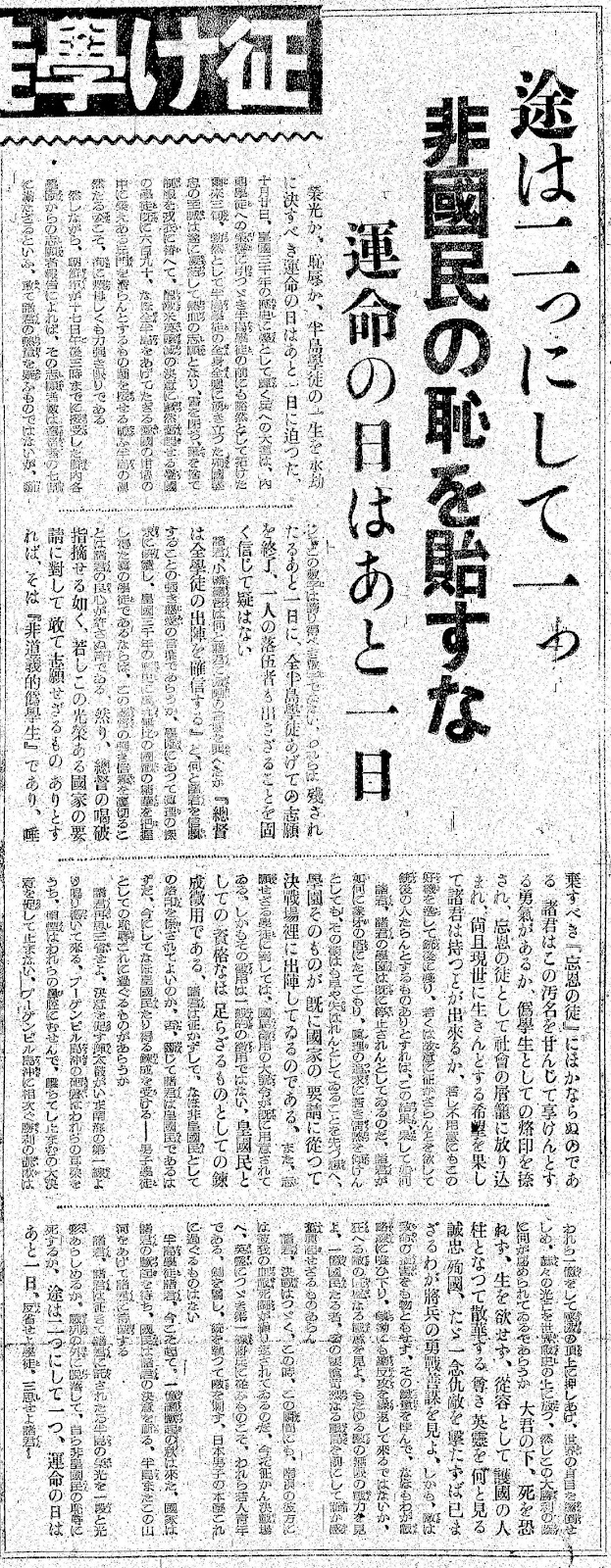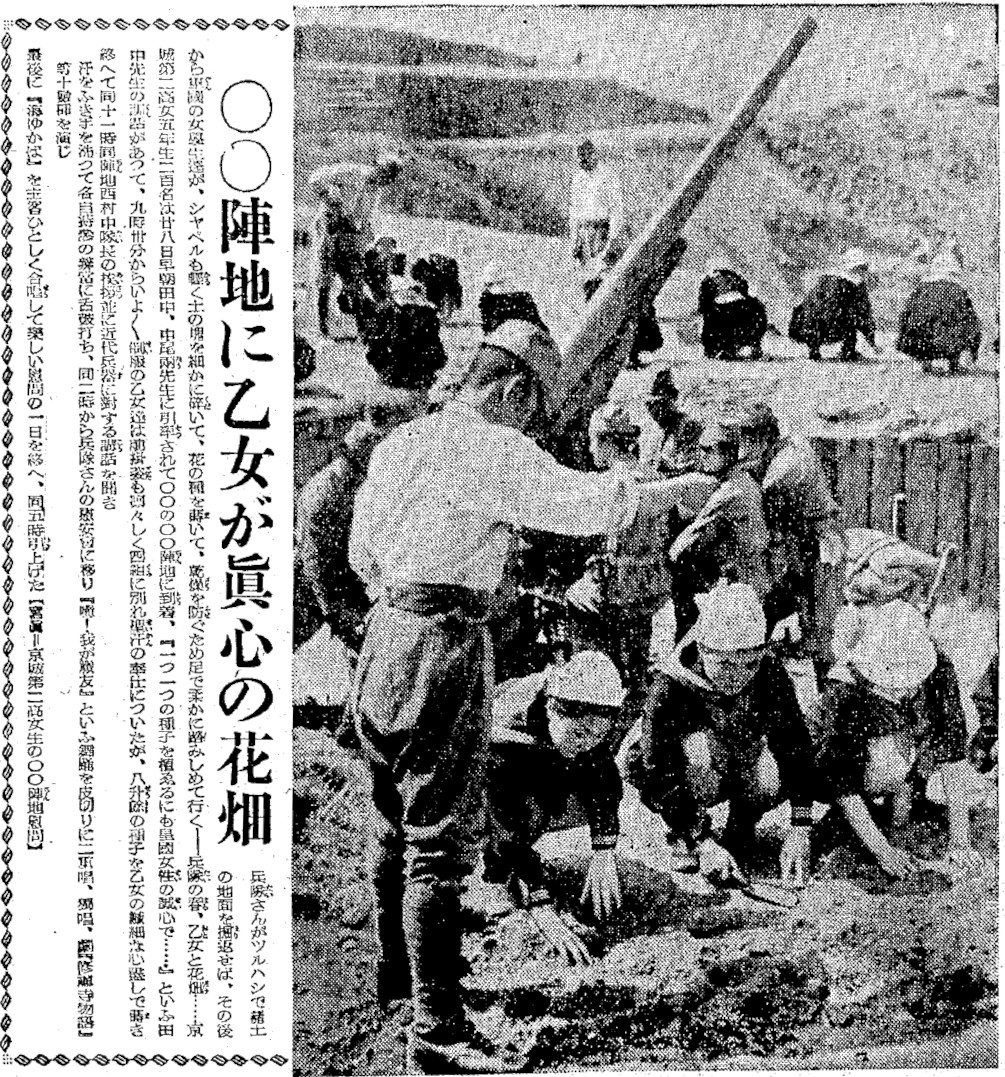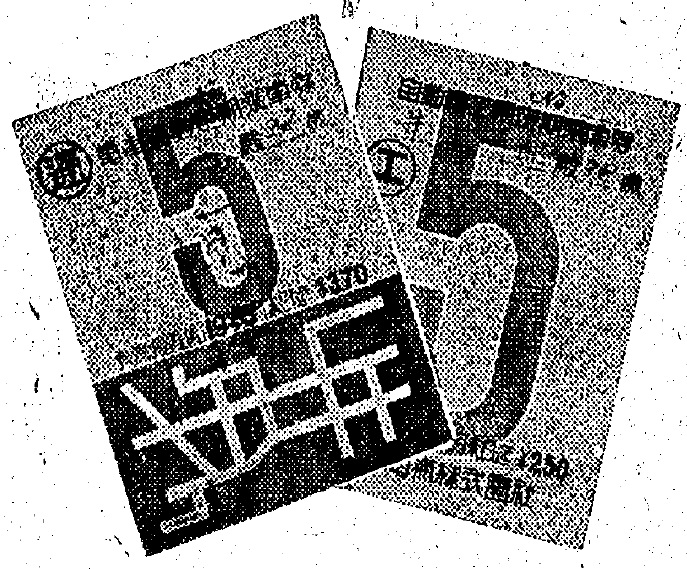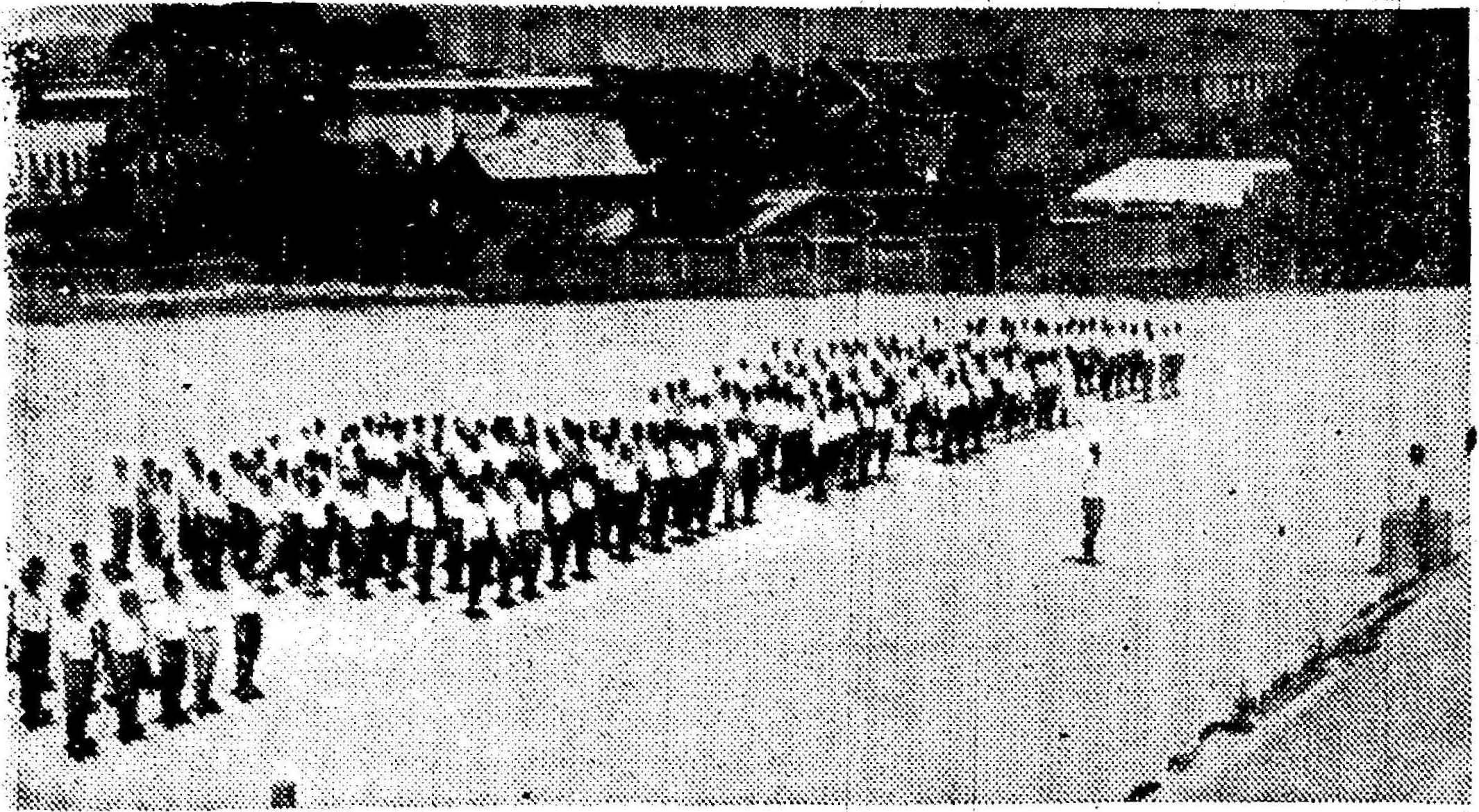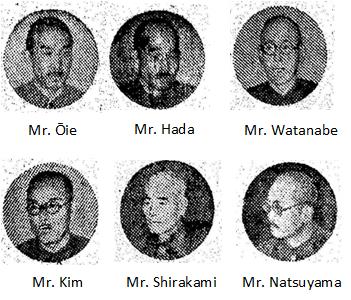
1943 editorial calls for Korean language to be wiped out, says Korean comfort women were touched by the noble appearance and hearts of the Imperial Japanese soldiers, and the women offered heartfelt comfort in response as their chests filled with excitement, their sincere hearts touching each other
Notes: This editorial article from 1943 explicitly and blatantly calls for the Korean language to be “wiped out”. Here is what historian Professor Kumatani from Kansai University says about the historical significance of this article:
(Translation) This is a blatant statement that the Korean language should be “wiped out” in the future. The editorial is really inconsistent with the policy of “Regular Use of the Japanese Language and Complete Solution of the Japanese Language”, which tried to deceive the Korean people by hiding the fact that it was intended to “wipe out” the Korean language.
As a matter of fact, about a month before the publication of this editorial, Governor Koiso [of Japan-colonized Korea] said in a Q&A session with reporters, “The dissemination of the Japanese language is necessary and the Japanese language must be fully understood as soon as possible, but I am annoyed that there have been erroneous reports about banning the Korean language”. In response to a question from the press, he replied, “Well, we don’t want to go too far. Of course, it is necessary to ensure that the Japanese language is used properly, but if there is such a situation, we have to think about it. We’ll have to wait and see”, feigning ignorance.
According to an article in the Mainichi Shimpo, at the “First Regular Press Conference” held on July 8, 1942, Governor Koiso was asked by reporters what he thought about the Korean language and the dissemination of the Japanese language, and he replied, “In order to become an Imperial subject, you must know the Japanese language as soon as possible, so the dissemination of the Japanese language is absolutely necessary. But, when we look at the actual situation in Korea, it is difficult to tell people not to use the Korean language, so we are seriously doing research. In any case, our guideline is to thoroughly disseminate the Japanese language”. Like his predecessor, Governor Minami, Governor Koiso replied that he wanted to tell the Korean people not to use the Korean language. It is not difficult to imagine that these statements had the effect of virtually permitting the development of the policy of wiping out the Korean language in every region of Korea.
Excerpt from The Enforcement of the Conscription System and the “Kokugo-Zenkai and Kokugo-Joyo” Policy in Colonized Korea (Part I), http://hdl.handle.net/10112/2235
(Original) 将来朝鮮語を「抹殺」すべきことを露骨に言明している。「国語常用・国語全解」政策が朝鮮語「抹殺」を意図していることをひた隠しにして朝鮮民衆を欺こうとしていたのに比して、実にちぐはぐな社説といわざるを得ない。
実は、この社説掲載の約1ヶ月前、小磯総督は記者団との問答の中で、「国語普及は必要だし一日も早く全解しなければならぬが、このため、ところによっては朝鮮語厳禁という風に誤り伝えられ随分困っているものもあるとの話だがこの対策は」という記者団からの質問に対して、「そう行過ぎになっては困る。もちろん国語の徹底は必要だがそんな状態があるとすれば考えねばならぬことだ。もう少し様子を見ることにしたい」と、とぼけて見せたのである。
「毎日新報」の記事によれば、小磯総督が1942年7月8日に行なった「第1回定例記者団会見」において、「国語普及と朝鮮語に関してどのように考えるのか」という記者団側からの質問に対して、「皇国民となるには、国語を一日も早く知らなければならない。だから国語普及は絶対に必要なことだが、未だ朝鮮の実情を見る時、朝鮮語を使うなと言うのは難しいことなので、慎重に研究しているが、ともかく国語は徹底して普及させる方針である」と語った。前任者の南総督同様、小磯総督も朝鮮民衆に対して、「朝鮮語を使うな」と言いたいのだと答えているのである。こうした発言が地方末端における朝鮮語抹殺政策の展開を事実上容認する結果をもたらしていたことは、想像に難くない。
This article refers to Kisaeng, or Korean female entertainers who sing, dance, play musical instruments and write poems to entertain upper-class men. In earlier times, their work did not necessarily always involve sexual service, but during Japanese colonial rule of Korea, they were more closely associated with sex work. By the 1940s, the vast majority were involved in prostitution. One prominent former Korean comfort woman, Kim Hak-soon, went to a Kisaeng school before her abusive father took her to China to find her a job. That was where she was detained by Imperial Japanese authorities and then forced to work as a comfort woman for the Imperial Japanese military. In this article, it is not explicitly said that the Kisaeng in the “comfort team” were doing sex work when they went to Japan to comfort wounded Imperial Japanese soldiers, but the colorful language used to describe the intimate relationships between the Kisaeng and the soldiers suggest that they did much more than just sing, dance, and play music to the soldiers.
This article is also significant in that Imperial Japan proudly and shamelessly publicized the fact that its soldiers were seeing comfort women. In fact, it celebrates the encounters between the Imperial Japanese soldiers and the comfort women by painting a ridiculously fantastical image of the Korean comfort women fawning in awe at the exalted, noble presence of the Imperial Japanese soldiers, their hearts excited with joy as they attend to the soldiers and learn the noble Japanese spirit and gratitude for the Japanese national identity from them. To an outsider who knows about the war crimes and atrocities committed by the Imperial Japanese military, it may sound patently absurd and delusional, but sadly enough, there are still Japanese people in prominent positions of power in the Japanese government, businesses, and universities who still believe this unbelievable propaganda. I have described this intractable problem in a long essay here: https://exposingimperialjapan.com/2021/11/nostalgia-for-imperial-japan-and-its.html.
This absurd lie does two things: 1. It paints a superlative picture of Imperial Japanese soldiers as the most exalted, noble, righteous soldiers ever to walk the face of the earth, beyond reproach. In essence, it becomes an impossibility even to consider that the Imperial Japanese soldiers would commit war crimes and atrocities. 2. It paints a superlative picture of the encounters between the Imperial Japanese soldiers and the comfort women as the most delightful encounters ever to benefit both the soldiers and the women. In essence, it becomes an impossibility even to consider that the comfort women were ever sexually exploited, such that it shuts down any question whether the comfort women were ever coerced or forced into becoming sex slaves.
So, if you ever incredulously wonder why far-right Japanese historical denialists shamelessly attack former sex slaves like Kim Hak-soon and question their testimonies, now you know that it is because of an old, absurd lie that has endured for at least eight decades against all odds. You can still find this lie alive and well in the tweets of Professor Tetsuo Arima, a Japanese historical revisionist and denialist at Waseda University who is notorious for asserting that the comfort women at Imperial Japanese comfort stations were willing prostitutes.
有馬哲夫 on Twitter: “元慰安婦の方々も昭和の日本語を話す人だと思う。ながく一緒にいれば、昔の時代のことを懐かしそうに語る人だと思う。だから挺身協(現正義連)がしたことが憎い。連中は私たちを引き裂いた。” / Twitter Translation: “I think the former comfort women were also Japanese speakers of the Showa era. I think that, if you stayed and talked with them for a long time, they would talk nostalgically about the old times. That’s why I hate the Korean Council for Justice and Remembrance. They drove us apart.”
(Translation)
Gyeongseong Ilbo (Keijo Nippo), August 16, 1943
Editorial
Unification of Japan and Korea and the use of the Japanese language
The reason why the performing arts comfort team was so well received in Japan proper and returned home with better results than expected was that the sincerity with which the comfort team comforted and encouraged the wounded and sick soldiers who had fallen injured for our sake and for the sake of our country, touched the hearts of the wounded and sick soldiers, as well as the hearts of our compatriots in Japan proper who cared for the soldiers.
It was not because of their skills in the arts or the beauty or ugliness of their faces. It was also not because of the curiosity that they attracted as kisaeng of a comfort team who had come all the way from Korea. It was because the entire comfort team was touched by the noble appearance and hearts of the wounded soldiers who joyfully gave their bodies and souls to their country, and the women offered heartfelt comfort in response as their chests filled with excitement. It was because the sincere hearts of the soldiers and the women touched each other. At the same time, it should be noted that one of the most significant reasons behind the good results of the comfort mission was that the comfort team followed the slogan telling them to regularly use the Japanese language. It should be especially noted that they persisted in regularly using Japanese without any Korean whatsoever in songs and greetings, as well as on the trains, in the lodgings, and in conversations among themselves.
This is an important point that should not be overlooked. It will give us a hint for the smooth implementation of various future measures to unite Japan and Korea based on the Japanese language. It seems that our compatriots in Japan proper were surprised to see the sincere efforts of the kisaeng, who were generally not considered to be well learned or educated, to freely use the Japanese language, to study the divinity of Japan by visiting the shrine at Ise and the rising sun at Futamigaura, and to learn the nobility of the Japanese spirit and gratitude for the Japanese national identity by means of the wounded soldiers.
Since even the kisaeng can speak the Japanese language so beautifully, there is something worth looking forward to in the transition to the Japanese language in Korea, where compulsory education will be implemented starting in 1946. It is a fact that the unification of Japan and Korea is not just a call. Indeed, it is already approaching completion both in name and reality. Thus, it is a fact that Japan proper’s renewed awareness of and interest in Korea have deepened.
This was the greatest harvest of the comfort mission. At the same time, it showed that the unification of Japan and Korea will be achieved by ensuring the thoroughness of Japanese language education through a level of enthusiastic willingness to go a step further than the regular use of the Japanese language and wipe out the Korean language. It also proved to be the avenue and the root for the establishment of a Righteous Korea based on the penetration of the true meaning of the Japanese national identity as Governor Koiso has described. It is true that the savage natives of the south, who do not understand the Japanese language, are cooperating with tears in their eyes cheering and welcoming the Imperial Army generals, calling them the coming of the divine soldiers. Your heart is adequately conveyed to the other side only after your feelings start naturally flowing to the other side, and for this to happen, sharing the Japanese language in common is an absolute requirement.
Since the conscription system will be implemented in Korea in 1944, it is important that there be no one in the appropriate age group who is unable to understand the Japanese language. Therefore, a special training order for young men was promulgated two years ago to be thoroughly implemented: For those young men who are in the appropriate age group and have not yet graduated national school, 600 hours of training per year will be allotted, and 400 hours of those will be dedicated to Japanese language education.
When compulsory education is implemented in 1946, the enrollment rate will be 90% for males and 50% for females, with an average enrollment rate of 70%. Plans are to transition to the Japanese language through official school education. However, the spread of the Japanese language is not sufficient if it only happens in schools. In government offices, companies, and on the streets, there are slogans saying, “Always use the Japanese language”. Even if interactions between Japanese people and Korean people involve the regular use of the Japanese language, there are no hopes for a thorough implementation if the Korean people are able to speak Japanese among themselves but choose not to do so.
In the military, the ability to speak the Japanese language is not taken into consideration, and no special treatment is given to Korean people. They will be trained as hard as the Japanese soldiers. If you are not proficient in the Japanese language during training, you will have to go through more hardships than necessary. You will not be able to become a good soldier for His Majesty.
A Korean laborer who went south on military business told his countrymen in a letter, “The natives heard that the Japanese had arrived, so they spoke to me in Japanese, but I couldn’t understand them, so they told me, ‘No, you’re not Japanese,’ and they refused to deal with me. If you can’t speak Japanese, you can’t keep up appearances as a Japanese and you can’t do anything. You must learn Japanese.”
Those who still cannot speak Japanese should learn it as soon as possible. Those who already understand the Japanese language should use it regularly. Then, let’s throw off the cold etiquette that walls off people from each other and directly bump sincere hearts with each other, so that we strive to establish a Righteous Korea by bearing the fruit of true Japanese-Korean unification. Let’s meet the burden of the decisive battle for the peninsula.
Source: http://www.archive.org/details/kjnp-1943-08-16
